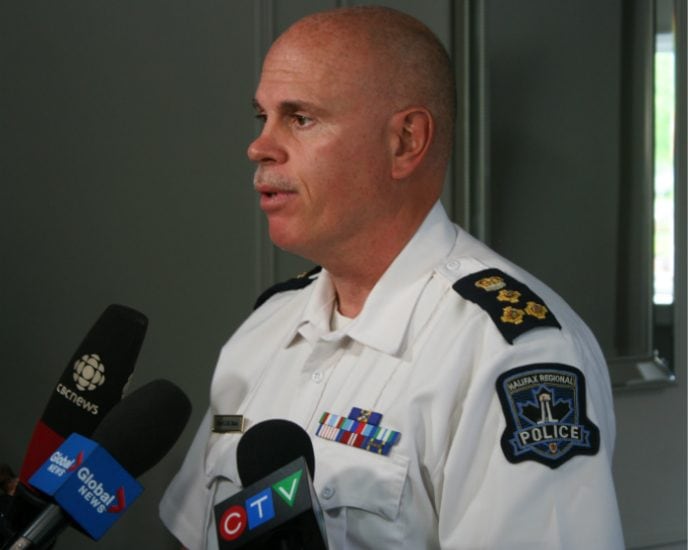KJIPUKTUK (Halifax) – An interim report presented by Halifax Regional Police chief J.M. Blais at the Halifax Board of Police Commissioners today suggests carding is necessary to effectively fight crime, and that too many checks and balances will kill the practice.

In the report Blais claims that street checks “are a vital part of the overall intelligence picture, and the records are used in virtually every investigation.” It’s “an estimation” though, not a fact, and Blais’ statement does raise the question how street checks are a vital part of solving say white collar crimes or domestic abuse, or crimes that are committed in the suburbs, where street checks don’t really seem to happen much.
After Ontario legislated constraints around the practice “very few in-person street checks have been carried out by members for fear of being labeled racist,” Blaise warns, suggesting only people of colour are ever street checked in Ontario.
People can just refuse to interact with an officer if they don’t want to talk, Blaise said during a scrum with reporters after the meeting, or they can file a complaint if they feel they are not treated properly.
Many Black people would say things aren’t that simple.
In fact, the report refers to meetings that have occurred where “the African diaspora and the African Nova Scotian community expressed “consistent and substantial concerns about their experiences with street checks, traffic stops and, more generally, the quality of interactions with police and privacy.”
The report is silent on this, but I’d guess that these victimized citizens weren’t recommending there be more talk and more analysis. Nonetheless, that’s what they are getting.
In particular the interim report commits to address carding data quality issues and deal with the question how long to keep the records, do more training on fair and impartial policing, and continue meeting with stakeholder groups to enhance community relationships.
As well, as we reported earlier Halifax Regional Police will work with the Nova Scotia Human RIghts Commission and its hired data expert to conduct an analysis of the statistical data. That is, if the Nova Scotia Human Rights Commission ever gets around to hire that expert. Nobody at today’s meeting appeared to know why that process hasn’t started yet.
There were no questions from the commissioners. After the meeting reporters asked questions about the interim report for ten minutes or so, and then moved on to the latest murders, and what people should do if they don’t feel safe.
See also: We’re having the wrong discussion about police street checks
If you can, please support the Nova Scotia Advocate so that it can continue to cover issues such as poverty, racism, exclusion, workers’ rights and the environment in Nova Scotia. A pay wall is not an option since it would exclude many readers who don’t have any disposable income at all. We rely entirely on one-time donations and a tiny but mighty group of kindhearted monthly sustainers.




Here’s some must-read info about rights regarding police stops: http://svan.ca/police-rights/